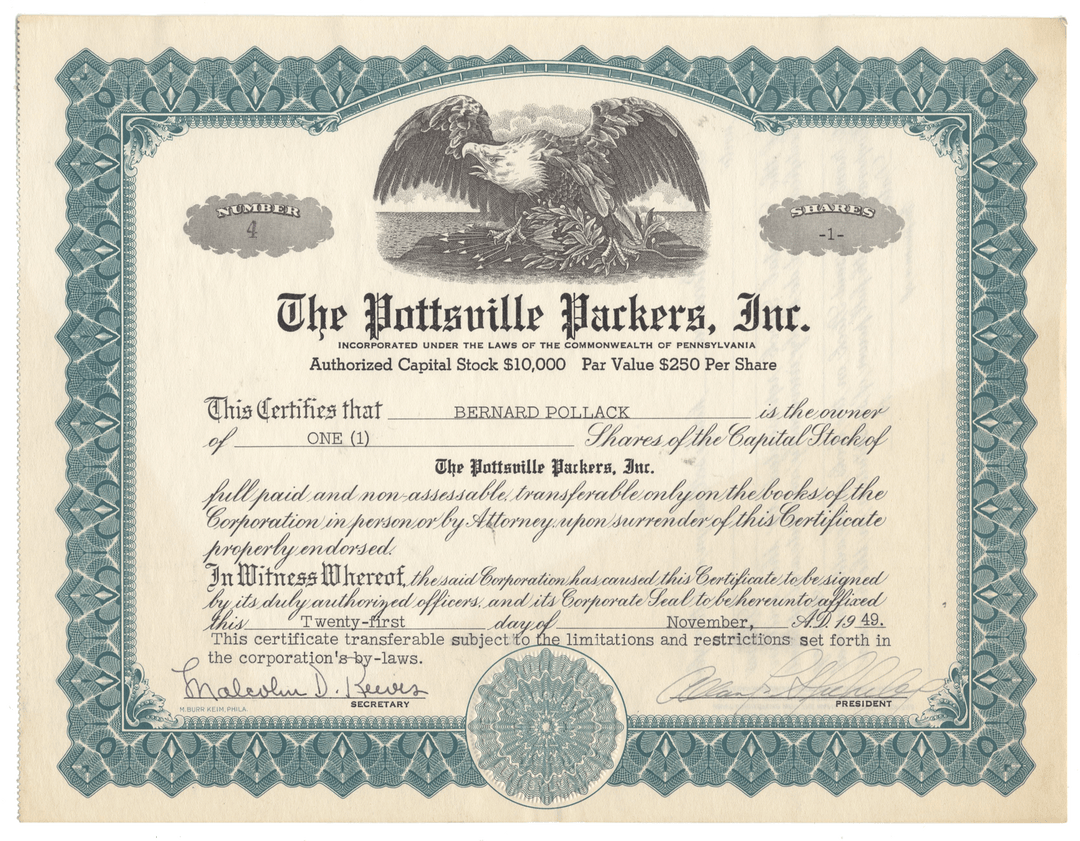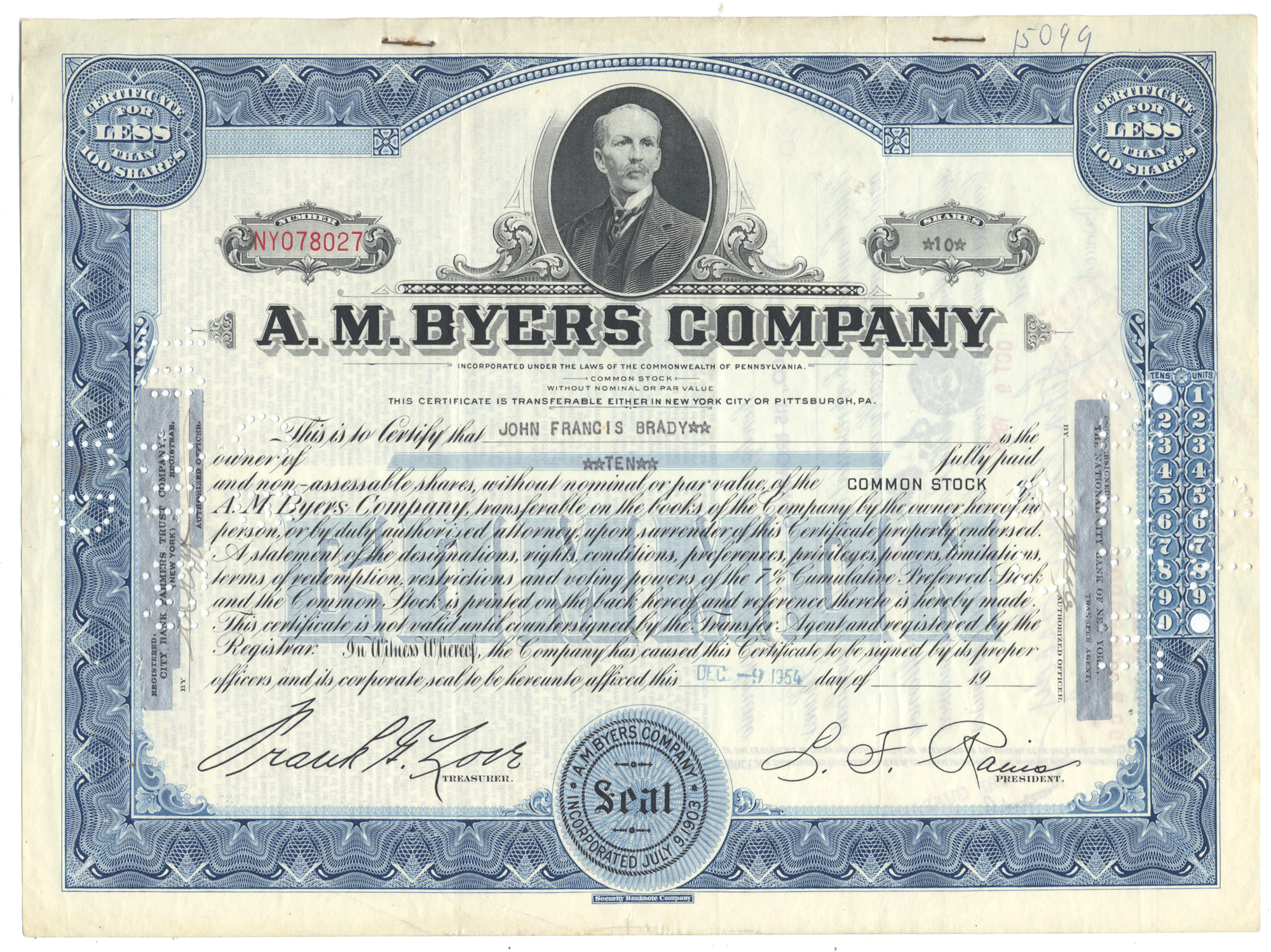
Pottsville Packers, Inc. (Basketball)
- Guaranteed authentic document
- Orders over $75 ship FREE to U. S. addresses
Product Details
CompanyPottsville Packers, Inc.
Certificate Type
Capital Stock
Date Issued
November 21, 1949
Canceled
No
Printer
M. Burr Keim of Philadelphia
Signatures
Hand signed
Approximate Size
10 3/4" (w) by 8 1/4" (h)
Images
Show the exact certificate you will receive
Guaranteed Authentic
Yes
Additional Details
NA
Historical Context
The Pottsville Packers were a minor league basketball team that competed in the Continental Basketball Association between 1946–47 and 1951–52. The club went through numerous names during its existence:
- Binghamton Triplets (1946/47) → moved to Pottsville in middle of season
- Pottsville Packers (1947–51/52) → moved to Wilkes-Barre for 1952/53 season
- Wilkes-Barre Aces (1952) → folded early into 1952/53 season
The team is probably best known for producing two NBA Coaches/General Managers - Jack Ramsay and Jack McCloskey.
McCloskey played only one game in the NBA - for the Philadelphia Warriors during the 1953 season - scoring 6 points.
He served as head coach of the University of Pennsylvania from 1956 to 1966, and of Wake Forest from 1966 to 1972. Following that, he served as the head coach of the Portland Trail Blazers from 1972 through 1974, earning a 48-116 win/loss record. He followed this stint as an assistant coach to Jerry West and the Los Angeles Lakers. When West became general manager in 1979, McCloskey felt he had earned the right to become head coach, but Jack McKinney was hired instead.
In 1979, he became general manager of the Detroit Pistons. During the next 13 years, "Trader Jack", as he was known, made over 30 trades, constantly upgrading his team to become a true challenger to the Boston Celtics, one of the dominant teams in the NBA's Eastern Conference. His best-known moves were drafting future Hall-Of-Famer Joe Dumars outside the lottery and rebounding champ Dennis Rodman in the second round of the NBA Draft, trading three players for future all-star center and dominant rebounder Bill Laimbeer and trading superstar Adrian Dantley for Mark Aguirre during the 1988–89 season, a move that helped the Pistons win the NBA championship in 1989 and 1990.
After the Chicago Bulls swept an injury-riddled Piston team in the 1991 Eastern Conference Finals, "Trader Jack" made his last moves. He acquired Darrell Walker, Brad Sellers, and Orlando Woolridge, and let go of Vinnie Johnson and James Edwards to try to make the team younger. He drafted Doug Overton in the second round that year (the Pistons had traded their first-round pick away), who did not even play the following season. The Pistons struggled with their chemistry, as key subs like John Salley did not improve their performance, yet they won 48 games. They lost in five games to the New York Knicks in the first round, and McCloskey left the team. He later served in the front offices of the Minnesota Timberwolves (1992–1995), and the Toronto Raptors (2004), the latter on an interim basis.
Ramsay played six seasons of professional basketball in the Eastern Pennsylvania Basketball League. To supplement his playing income, he coached basketball at St. James High School in Chester, Pennsylvania and later at Mount Pleasant High School, 1953-4, in Wilmington, Delaware.
After coaching in the high school and minor-league ranks during the early postwar years, Ramsay became head coach at St Joseph's in 1955. Ramsay got the job after accidentally meeting the college's moderator of athletics at a Philadelphia Phillies baseball game. Ramsay was hired as coach for the 1955-56 basketball season for $3,500.
In Ramsay's first season at St Joseph, the Hawks went 23-6 to win their first Big 5 crown. This first season also marked the school's first-ever postseason playoff berth, in which St Joseph placed third in the NIT after losing to the University of Dayton. Ramsay would remain at St. Joseph's through 1966, leading the Hawks to six more Big 5 crowns, five straight seasons of first-place finishes in the Middle Atlantic Conference, ten postseason appearances, and a Final Four stint in 1961.
At age 41, after leading his team to a 24-5 record in 1965-66, Ramsay was diagnosed with an edema on the retina of his right eye. Ramsay left his coaching job with the Hawks on the doctors' recommendation that he reduce stress. Ramsay finished with a record of 234-72 in 11 years. He would remain the winningest coach in St. Joseph's history until Phil Martelli passed him in 2005.
After leaving St Joseph's, Ramsay was hired as general manager by the Philadelphia 76ers. Team owner Irv Kosloff gave Ramsay a three-year $25,000 deal. In Ramsay's first season, the 76ers won the NBA title after finishing 68–13, then the best record in NBA history. The team averaged 125 points with Wilt Chamberlain contributing an average of 24 points, 24 rebounds and eight assists per game. However, Ramsay was forced to trade Chamberlain and Chet Walker, receiving little value in return.
In 1968, Ramsay became the 76ers head coach. In Ramsay's first game coaching an NBA team, the 76ers zone press won 114–96 against the Los Angeles Lakers at the Spectrum, even though Lakers players Jerry West, Elgin Baylor and Chamberlain combined for 71 points. The 76ers finished that first season with Coach Ramsay 55–27. The 76ers led the NBA in scoring (119 points per game) as a result of Ramsay's style of aggressive pressing defense.
In his four seasons as 76ers coach, Ramsay led the team to three playoff appearances. While the 76ers continued to be contenders, the team was much weaker than in previous seasons. The team's collapse came in 1971–72, when the 76ers posted to 30–52 record and missed the playoffs for the first time in team history.
After the 1971–72 season, Ramsay became the head coach of the Buffalo Braves. After compiling a losing 21–61 record in that first season in Buffalo, Ramsay had the team double their win total the next season by finishing first among the league's 17 teams in offense (111.6) even though they were last in defense (111.8). That second season in Buffalo had Ramsay leading the Braves to the playoffs, where they pushed the eventual champion Celtics to six games in the conference semifinals. His Buffalo tenure was almost a mirror image of his time with the Sixers—four seasons, three playoff berths; however, he did not leave Buffalo in the sort of wreckage that had occurred in Philadelphia. Instead, owner Paul Snyder was in the process of selling the team to out-of-town interests (the economy of Western New York was unable to support both the Braves and hockey's Sabres as evidenced by the Braves' attendance figures at the time but Snyder lost interest) and Ramsay requested not to be a part of the upheaval. In his four seasons with the Braves, Ramsay compiled a record of 158–170.
In 1976, Ramsay became the head coach of the Portland Trail Blazers. When Ramsay arrived, the Blazers had not made the playoffs or compiled a winning season record in their six-year history. However, a young Blazers team, led by Bill Walton, was starting to gel. Ramsay also benefited from the 1976 ABA dispersal draft, in which the Blazers obtained power forward Maurice Lucas.
In his first season in Portland (1977), Ramsay led the Blazers to their first NBA title. In his second season, the Blazers were 50–10 after 60 games and favored to repeat as NBA champions. However, Walton broke his foot, ending the Blazers' winning prospects. Ramsay continued to coach the Blazers until 1986 with general success. However, he never equaled the achievements of his first seasons. During Ramsay's last nine seasons in Portland, the Blazers only won two playoff series. He also coached the Western Conference side in the 1978 All-Star Game.
Ramsay took over as coach of the Indiana Pacers for the 1986–87 season. Ramsay coached the Pacers to their second winning record as an NBA team. However, Ramsay was unable to duplicate that success in later seasons. Ramsay resigned as Pacers coach during the 1988–89 season after a 0–7 start.
When Ramsay left the Pacers, he was second on the all-time wins list for NBA coaches with 864 wins, trailing only Red Auerbach. When he retired, Ramsay had the most combined college and professional wins of any coach. In 1992, Ramsay was inducted into the Basketball Hall of Fame. The Trail Blazers retired Number 77 in Ramsay's honor on Jan. 14, 1993, symbolically recognizing the 1977 Championship. In 1996, he was voted one of the 10 greatest coaches in NBA history.
After his coaching career ended, Ramsay spent nine years as a television color commentator for the Philadelphia 76ers and the Miami Heat.
Related Collections
Additional Information
Certificates carry no value on any of today's financial indexes and no transfer of ownership is implied. All items offered are collectible in nature only. So, you can frame them, but you can't cash them in!
All of our pieces are original - we do not sell reproductions. If you ever find out that one of our pieces is not authentic, you may return it for a full refund of the purchase price and any associated shipping charges.




